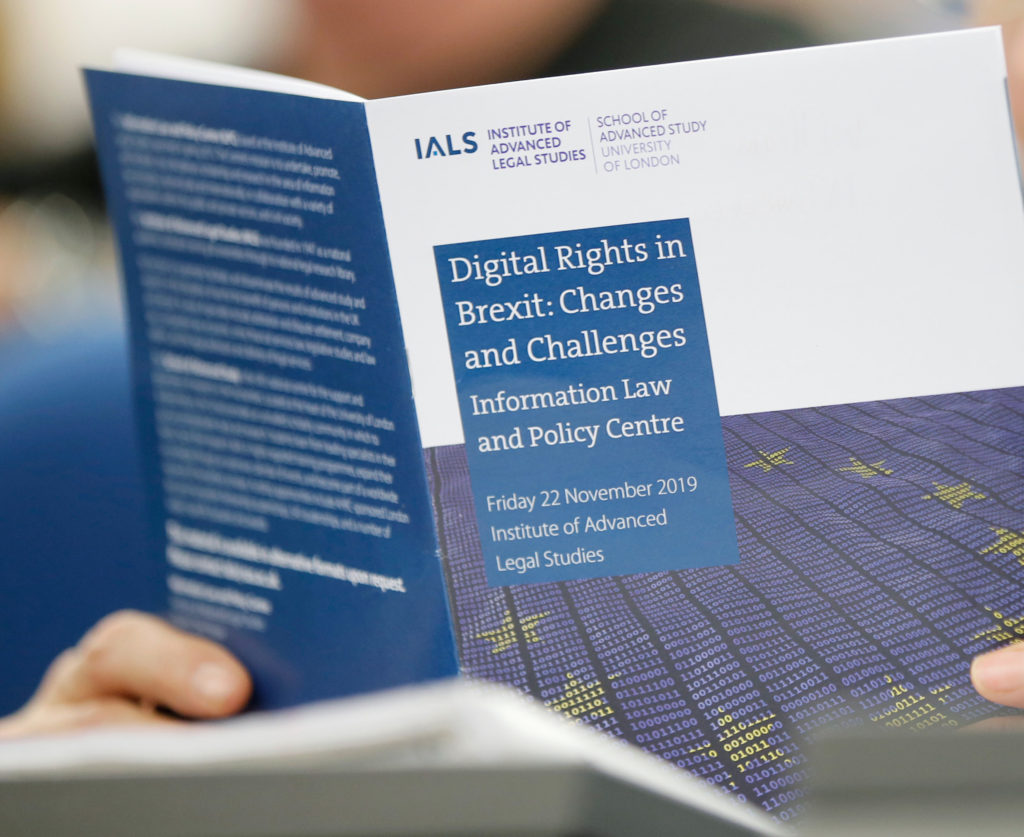
Last year, we held our Annual Lecture and Conference ‘Digital Rights in Brexit: Changes and Challenges’, bringing together an eclectic mix of experts, academics and civil society. A plethora of pertinent topics relating to digital rights post-Brexit were explored, from mass surveillance, accessibility rights to immigration, with fantastic insights and engaging discussions from the speakers, discussants, chairs and attendees.
In this edition of the Spotlight Series, Dr Rachel Adams, post-doctoral researcher at the ILPC, highlights key points and take-aways from the event.
Our Annual Lecture and Conference last year ‘Digital Rights in Brexit: Changes and Challenges’ explored a myriad of topics from mass surveillance, online harms, employment rights to criminal justice. What were some of the key concerns raised about digital rights post-Brexit?
Given the date on which the Conference was held (22 November 2019), there was broad political uncertainty as to how Brexit would unfold. While there is an overall political commitment that the protection of digital rights, and particularly data and privacy rights, will not change after Brexit has taken place, the discussions of the Conference indicated that there is still a great deal of worry about levels of protection post-Brexit. One of the key concerns relates to the role of the Information Commissioner’s Office who, historically, has played a significant role in developing the data protection work of the European Commission. Ensuring the ICO is well equipped with the necessary resources to fulfil on all areas of its mandate will be important. Representatives from the ICO indicated that further input is required from the commercial sector and experts to ensure guidance they deliver is well-informed.
One of the main issues discussed throughout the day was the high levels of surveillance and state-led data collection in the UK. Participants discussed the importance of promoting public debate on state-led surveillance to work against the normalisation of CCTV and other forms of surveillance that is so common in the UK, more than any other country in Europe.
Going forward, what were some of the suggestions as to how these concerns should be addressed?
As mentioned above, ensuring the ICO is well resourced and capacitated to meaningfully engage with a broad range of different stakeholders is particularly important for addressing digital rights concerns post-Brexit, in addition to raising public debate and highlighting the problems of and limitations to the enjoyment of digital rights of ubiquitous surveillance.

Delivering the Annual Lecture, Dr Jeni Tennison OBE, suggested the UK should lead the way in responsible technology and to avoid adopting variants of American, EU and Chinese models on dealing with data. What is a prime example of the UK’s leadership in ethical innovation?
While the UK government has done much to increase ethical innovation, including by establishing the Centre for Data Ethics and Innovation, two of the key examples that come to mind is the work of the Open Data Institute in exploring models for data trusts in order to ethically and fairly share data between trusted partners. The other example is the broader commitment the UK government has made to ethical innovation and ethical artificial intelligence and data processing in policies, such as the House of Lords report: AI: Ready, Willing and Able? This document contains commitments to including ethical innovation in school curriculums, and considerations of how ethical innovation can be incentivised.
‘Power’ in relation to data was a key word that came up across numerous panels. What steps should the UK take to ensure accountability with the use of data?
Many of the concerns regarding the legal framework for ensuring accountability for the use of data relates to the Investigatory Powers Act. The Act, passed in 2016, effectively legalises a whole host of unethical mass surveillance practices. Addressing the short-comings of this law will therefore be a critical step in promoting state accountability. In addition, and as mentioned above, ensuring that there is broad public discussion on matters of surveillance and the problems associated with encroaches on individual and group privacy rights, is also a necessary part of the equation of putting public pressure on the state to be more accountable.
